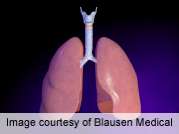Pulmonary complications are under-recognized in systemic juvenile idiopathic arthritis, and are often fatal, according to a study published online Nov. 8 in Arthritis Care & Research.
(HealthDay)—Pulmonary complications are under-recognized in systemic juvenile idiopathic arthritis (sJIA), and are often fatal, according to a study published online Nov. 8 in Arthritis Care & Research.
Yukiko Kimura, M.D., from the Hackensack University Medical Center in New Jersey, and colleagues utilized an electronic listserv to identify sJIA patients who developed pulmonary artery hypertension (PAH), interstitial lung disease (ILD), and/or alveolar proteinosis (AP). The 25 patients were compared to a sJIA cohort of patients from the Childhood Arthritis and Rheumatology Research Alliance (CARRA; 389 participants).
The researchers found that, compared with the CARRA cohort, patients were significantly more likely to be female; have more systemic features; and to have been exposed to an interleukin-1 (IL-1) inhibitor, tocilizumab, infliximab, corticosteroids, intravenous immunoglobulin, cyclosporine, and cyclophosphamide. During the course of their disease, 80 percent of the patients had macrophage activation syndrome (MAS), and 60 percent had MAS at pulmonary diagnosis. PAH was seen in 16 patients, ILD in seven, and AP in five patients. At pulmonary symptom onset, 68 percent of patients were taking or recently (one month or less) discontinued a biologic agent and 48 percent were taking anti-IL-1 therapy. At a mean of 8.8 months following pulmonary diagnosis, 68 percent of patients died.
"PAH, AP and ILD are under-recognized complications of sJIA which are frequently fatal," the authors write. "These may be the result of severe uncontrolled systemic disease activity, and may be influenced by medication exposure."
Several authors disclosed financial ties to the pharmaceutical industry.
More information:
Abstract
Full Text (subscription or payment may be required)
Journal information: Arthritis Care & Research
Copyright © 2012 HealthDay. All rights reserved.



















